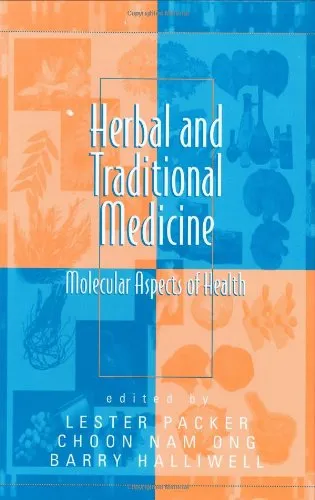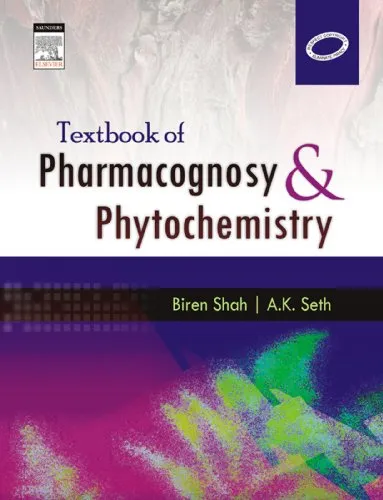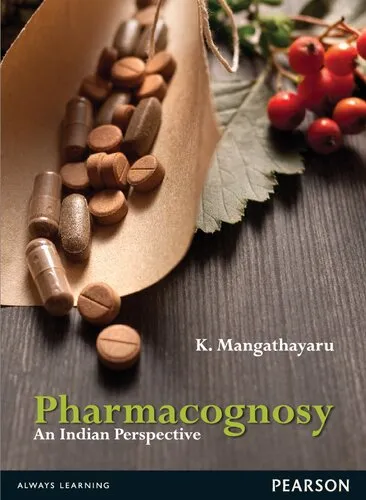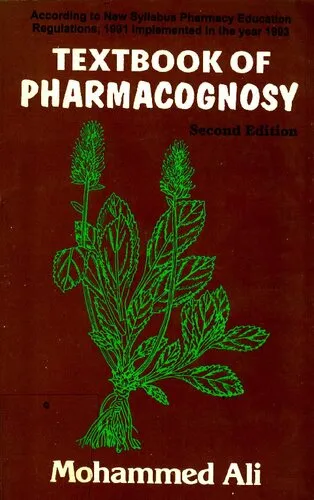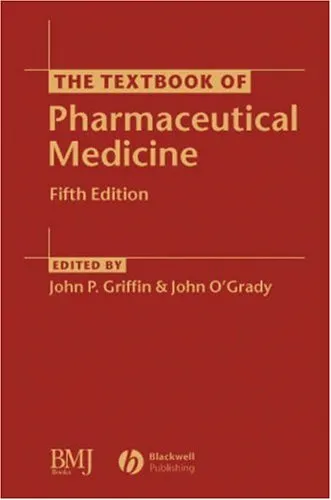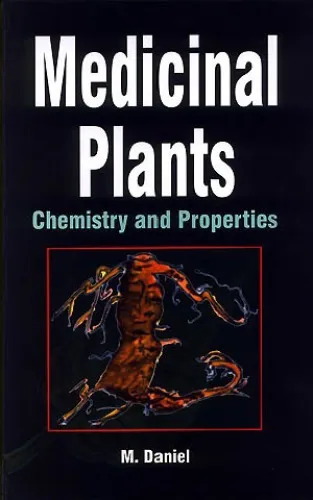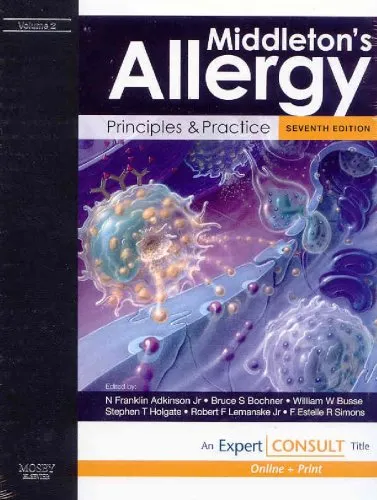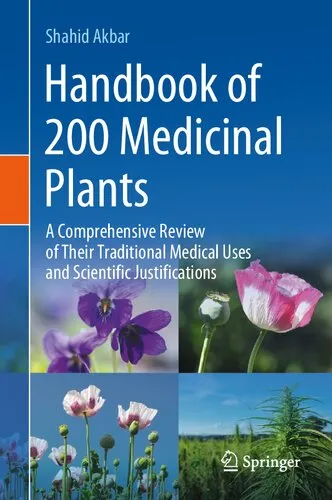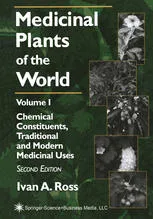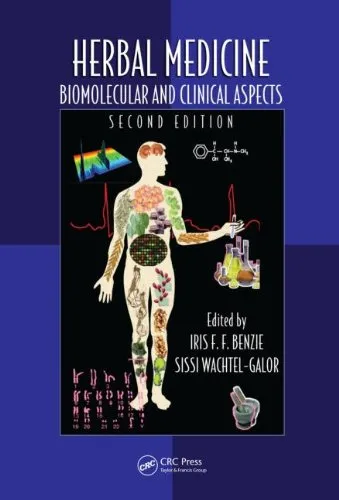Herbal and Traditional Medicine: Biomolecular and Clinical Aspects
4.5
بر اساس نظر کاربران

شما میتونید سوالاتتون در باره کتاب رو از هوش مصنوعیش بعد از ورود بپرسید
هر دانلود یا پرسش از هوش مصنوعی 2 امتیاز لازم دارد، برای بدست آوردن امتیاز رایگان، به صفحه ی راهنمای امتیازات سر بزنید و یک سری کار ارزشمند انجام بدینکتاب های مرتبط:
مقدمه کتاب
کتاب "Herbal and Traditional Medicine: Biomolecular and Clinical Aspects" به قلم لستر پاکر و همکاران، اثری ارزشمند در حوزه پزشکی گیاهی و رویکردهای درمانی سنتی است. این کتاب به بررسی دقیق زیستمولکولی و ابعاد بالینی اثرات گیاهان دارویی میپردازد و با ارائه اطلاعات گسترده و پژوهشمحور، پلی میان علم مدرن و دانش باستانی پزشکی گیاهی ایجاد میکند.
خلاصهای دقیق از کتاب
این کتاب در چند بخش اساسی تدوین شده که هر بخش به جنبهای خاص از موضوع میپردازد. در ابتدا، مبانی پایهای استفاده از داروهای گیاهی و نقش آنها در سیستم پزشکی مدرن و جایگاه آنها در تاریخ پزشکی بهصورت علمی و مستند بررسی شده است. در بخشهای میانی، تأثیرات زیستشناختی گیاهان دارویی با استفاده از مطالعات گسترده Biomolecular توصیف شده و نقش آنها در پیشگیری و درمان بیماریهای مزمن مانند دیابت، سرطان و بیماریهای قلبی مورد توجه قرار گرفته است. بخش آخر کتاب به تحلیل بالینی کاربردهای درمانی این گیاهان اختصاص یافته و نحوه استفاده صحیح و ایمن آنها، بر اساس نتایج مطالعات مدرن، ارائه میشود.
نکات کلیدی کتاب
- ارائه توضیحات دقیق درباره مکانیسمهای زیستشناختی گیاهان دارویی با تمرکز بر روشهای آزمایشگاهی مدرن
- بررسی تطابق اثرات درمانی داروهای گیاهی با مطالعات بالینی و کاربرد عمومی آنها
- ایجاد ارتباط علمی میان اصول پزشکی سنتی و یافتههای علمی مدرن
- تحلیل خطرات و فواید استفاده از گیاهان دارویی بر اساس پژوهشهای انجام شده
- معرفی روشهای نوین مطالعه گیاهان دارویی برای دانشمندان و متخصصان پزشکی
جملات معروف از کتاب
"Understanding the biomolecular mechanisms of herbs helps bridge the gap between traditional wisdom and modern evidence-based medicine."
"Plant-based therapies, when examined under rigorous clinical trials, reveal how deeply rooted traditional practices can contribute to modern health solutions."
چرا این کتاب مهم است؟
کتاب "Herbal and Traditional Medicine: Biomolecular and Clinical Aspects" یکی از معدود منابع علمی است که با نگاه تلفیقی، دانش سنتی پزشکی گیاهی را با پیشرفتهای مدرن در علوم زیستی و پزشکی ترکیب میکند. این اثر نهتنها برای محققان حوزه Biomolecular بلکه برای پزشکان، گیاهشناسان و حتی علاقهمندان به طب سنتی نیز یک مرجع منحصربهفرد محسوب میشود. اهمیت این کتاب در ارائه فهم عمیق از اثرات درمانی گیاهان دارویی و ایجاد آگاهی از چگونگی مطالعات علمی مرتبط بر پایه دادههای بالینی واقعی نهفته است.
با توجه به رشد تقاضا برای داروهای طبیعی و گیاهی در سراسر جهان، این کتاب بهعنوان راهنمای علمی و عملی میتواند نقطه عطفی در ارتقاء استفاده اصولی و آگاهانه از این مواد باشد. اهمیت دیگر آن در فراهم آوردن نگاهی انتقادی و علمی به تأثیرات و محدودیتهای داروهای گیاهی است، که اغلب در منابع سنتی نادیده گرفته میشود. در دنیایی که پزشکی مدرن بهدنبال گزینههای درمانی پایدار و طبیعی است، این کتاب منبعی بیبدیل به شمار میرود.
Introduction to Herbal and Traditional Medicine: Biomolecular and Clinical Aspects
The book “Herbal and Traditional Medicine: Biomolecular and Clinical Aspects” serves as a comprehensive exploration into the fusion of ancient herbal practices and modern biomedical research. Written by Lester Packer and co-authors, this extensive resource delves into the scientific underpinnings of herbal remedies while honoring the traditional wisdom of ethnomedicine. In an age where integrative medicine is gaining momentum globally, this book seeks to bridge the gap between time-tested practices and cutting-edge molecular science.
The book offers an exceptional collection of insights into therapeutic plants, the bioactive compounds they contain, and their clinical relevance. Going beyond anecdotal evidence, it critically evaluates how these natural products interact with human biological systems to offer possible solutions to a myriad of diseases. With contributions from multidisciplinary experts, including physicians, pharmacologists, traditional healers, and biochemists, this book attempts to redefine the way herbal and traditional medicines are perceived and utilized today.
Detailed Summary
This book is divided into thoughtfully curated sections that systematically examine the molecular and clinical aspects of herbal and traditional medicines:
1. Anthropological & Historical Perspectives: The book begins by grounding readers in the history of plant-based medicines. It highlights how ancient civilizations, from Ayurveda in India to Traditional Chinese Medicine, developed healing systems that relied heavily on botanicals.
2. Chemical Composition and Pharmacology: A considerable section focuses on the molecular composition of medicinal plants, unlocking the secrets behind their bioactive compounds. Flavonoids, alkaloids, and terpenoids are explored in meticulous detail, with examples of their roles in treating inflammation, cancer, and neurodegenerative diseases.
3. Clinical Applications: The clinical relevance of herbal therapies is examined, with rigorous studies presented on conditions ranging from cardiovascular diseases to immune deficiencies. The authors also address challenges such as standardization, dosage, and safety concerns.
4. Modern Integration: The book concludes with a discussion on how ancient wisdom can be paired with modern biomedical techniques such as genomics, proteomics, and nanotechnology to advance medical treatments.
Key Takeaways
- Herbal medicine holds immense potential for treating chronic and lifestyle-related disorders when used alongside modern diagnostics.
- Bioactive compounds in plants possess pharmacological activities that are being increasingly validated by scientific research.
- Integrating traditional and modern medicine can lead to more effective and holistic healthcare solutions.
- A collaborative approach between ethnobotanists, pharmacologists, and clinicians is necessary to fully harness the potential of herbal medicines.
- Standardization and clinical trials are crucial to address safety concerns and ensure the efficacy of natural therapies.
Famous Quotes from the Book
"Traditional medicine is not merely folklore but a repository of profound scientific intuitions waiting to be validated."
"In the realm of health, nature's gifts often outshine synthetic alternatives through their elegance and biocompatibility."
"Understanding the chemistry of life is the key to merging ancient remedies with modern therapeutic advancements."
Why This Book Matters
The significance of this book lies in its ability to bring credibility and scientific rigor to an area of medicine that has often been overlooked or misunderstood. The following reasons underscore its importance:
- Bridging Knowledge Systems: This book successfully combines the wisdom of traditional medicine with modern biochemical and clinical methodologies, appealing to both practitioners and researchers.
- Encouraging Evidence-Based Practice: By presenting robust clinical and experimental data, it advocates for herbal therapies grounded in science, not speculation.
- Promoting Sustainability: The book highlights the ethical and ecological responsibilities of preserving biodiversity and traditional medicinal knowledge for future generations.
- Global Relevance: With its multidisciplinary approach, this book resonates across cultures and medical systems, emphasizing the universal value of herbal therapeutics.
- Vision of Integration: It serves as a roadmap for institutions and policymakers to incorporate integrative medicine into formal healthcare systems worldwide.
دانلود رایگان مستقیم
شما میتونید سوالاتتون در باره کتاب رو از هوش مصنوعیش بعد از ورود بپرسید
دسترسی به کتابها از طریق پلتفرمهای قانونی و کتابخانههای عمومی نه تنها از حقوق نویسندگان و ناشران حمایت میکند، بلکه به پایداری فرهنگ کتابخوانی نیز کمک میرساند. پیش از دانلود، لحظهای به بررسی این گزینهها فکر کنید.
این کتاب رو در پلتفرم های دیگه ببینید
WorldCat به شما کمک میکنه تا کتاب ها رو در کتابخانه های سراسر دنیا پیدا کنید
امتیازها، نظرات تخصصی و صحبت ها درباره کتاب را در Goodreads ببینید
کتابهای کمیاب یا دست دوم را در AbeBooks پیدا کنید و بخرید
